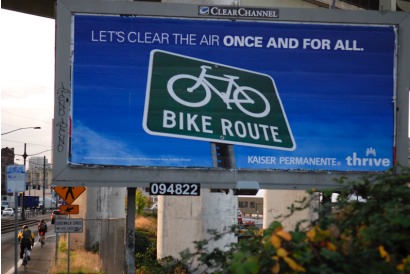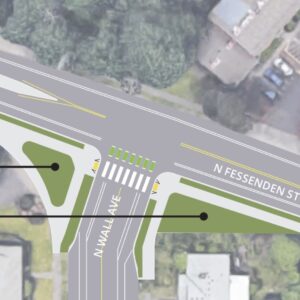Seattle news site Publicola reports that Seattle Children’s Hospital has stepped up with a $2 million investment for biking and walking infrastructure. Here’s a blurb from the Publicola story:
“Children’s plans to spend around $4 million over the next 20 years improving Northeast Seattle’s walkability, bikeability, and drivability as part of the hospital’s expansion and its Comprehensive Transportation Plan. The hospital will invest $2 million on bike and pedestrian improvements around the Ravenna and Sand Point neighborhoods, $1.4 million on general capital investments “in line with Seattle’s priorities,” and $500,000 on intelligent transportation systems (essentially “smart” signals that improve traffic flow and predict congestion).”
And here’s how the hospital’s transportation director says they justify the cost:
“… we see this as furthering our health care mission as well. Providing young people with safe places to walk and bike allows them to be active and helps combat obesity. Alternative transportation reduces congestion and pollution which is linked to health problems…”
Here in Portland we’ve got several major hospitals that are bike-oriented in various ways.

(Photo © J. Maus)
Kaiser Permanente has made cycling a major part of their “Thrive” marketing campaigns (even running a bike-centric commercial during the 2008 Olympics). Dr. Philip Wu with Kaiser sits on Metro’s Executive Committee on Active Transportation and was a keynote speaker at the Oregon Bike Summit.
Providence Hospital (which happens to be adjacent to the future Sullivan’s Gulch Trail along I-84) has been recognized as a “Bike Friendly Business” by the League of American Bicyclists. Providence also has an official Volunteer Bicycle Coordinator position which is filled by 2006 BTA Alice Award winner Darren Pennington (Darren also tells me Providence is hosting the 50s Bikeway Project Citizens Advisory Committee meetings).
We’ve got a major funding gap for active transportation and wrestling away money through the DOT and legislative measures will be a bruising and drawn out battle. Perhaps it’s time to seek more private investments to help build our bike network. We have the hospitals and the relationships ready to go. Let’s make it happen!







Thanks for reading.
BikePortland has served this community with independent community journalism since 2005. We rely on subscriptions from readers like you to survive. Your financial support is vital in keeping this valuable resource alive and well.
Please subscribe today to strengthen and expand our work.
For anyone in the Seattle interested in providing input on potential projects that this $$$ might fund, there’s a Children’s-sponsored “Livable Streets Workshop” on November 13th. Details are:
10 – 2 PM
Gould Hall – University of Washington
3949 15th Ave NE
224 Gould Hall
Seattle, WA 98195-5725
More info at http://construction.seattlechildrens.org/livablestreets/
OK $4million in 20 years? that works out to $50000 a year, or $25000 a year for bike/ped projects. That works out to a lot of bike staples and that’s about it.
Sorry, my math went south on that one. That’s $20000 a year total with $10000 for bike/ped projects.
Re #2 & #3: Opus the Poet – I’m not sure what you are trying to say. Is it that the hospital should have given more? Or that the amount doesn’t merit kudos? (It’s the “…that’s about it” part of your comment that suggests your disappointment.)
A reality is that most bicycle/ped improvements need money in order to happen. Money for planning, money for equipment, money for construction, and probably money for even more categories.
I don’t know anything about this hospital or issues in Seattle. I presume the hospital was under no obligation to contribute anything. That they chose to do this is great.
And giving such positive reinforcement is the best way to encourage other organizations to act similarly.
Jon, I’m obligated to add OHSU to that roster of bike-friendly hospitals. We have over a 1,000 bicyclists that participate in our cash-for-biking program that is now approaching a payout of $200,000 annually. With facility upgrades, that’s a quarter-million dollar annual program. OHSU is also a top sponsor of the Bike Commute Challenge and, despite our employees splitting across 26 teams, I’m pretty sure from the final tally, I was lucky enough to captain the team with the most miles of any business or team (28k+). (There’s no award for that one yet, but in unabashed self-interest for my team, I’ve been plugging the idea to BTA.)
Also, today is, coincidentally, the launch of our new bike site (can only be accessed by OHSU members, info here: http://www.ohsu.edu/parking/bike/OHSUBikeSite2010.pdf). If you’re not exhausted yet from all these plugs, I’ll be talking more on bike incentives and our new website at this month’s public meeting on biking on Nov 18. http://www.portlandonline.com/transportation/index.cfm?a=144945&c=34816
John Landolfe
Multimodal Transportation
Oregon Health & Science University
The parentheses got caught in the hyperlink on one of those links: http://www.ohsu.edu/parking/bike/OHSUBikeSite2010.pdf
And Kaiser Permanente is the presenting sponsor for Portland Sunday Parkways. They called Sunday Parkways so “thrivy”.